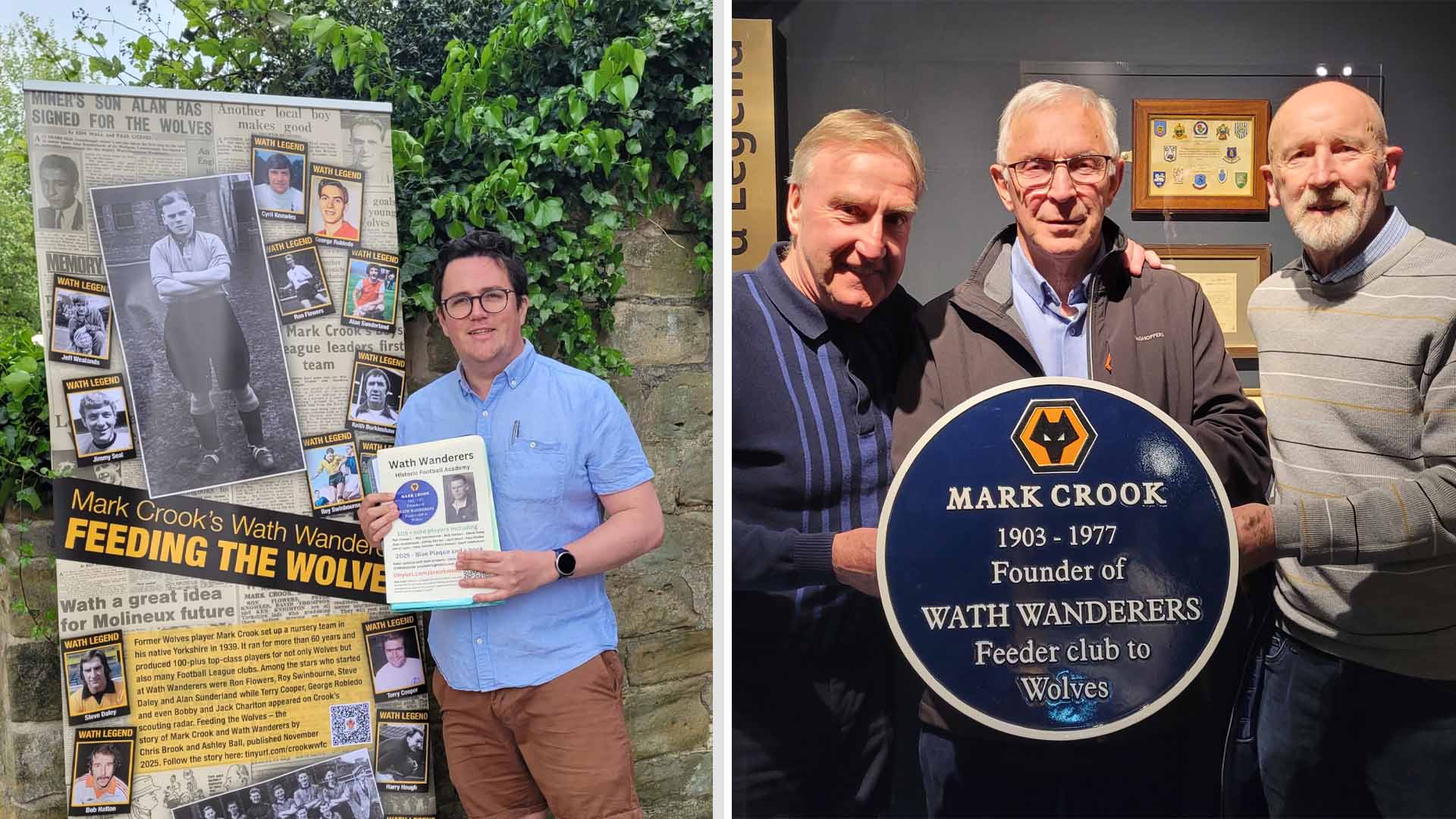Alumni Ashley’s first book tells story of Yorkshire football talent scout

Pictured are Ashley Ball, and on the right are former Wath Wanderers and Wolves players Steve Daley, Gerry Taylor and Bob Hatton.
The first book by Huddersfield alumni and Barnsley Chronicle journalist Ashley Ball will shine a spotlight on a Yorkshire football scout who unearthed a seam of talent including England internationals, FA Cup winners and one of the most expensive players of his time.
Feeding The Wolves – Mark Crook’s Wath Wanderers tells the story of how Mark Crook found and developed over 100 players who started out at his junior club in Wath-upon-Dearne before going on to play professionally.
Due to Crook’s own time as a player with Wolverhampton Wanderers, many moved to the Molineux club during its greatest period of success in the 1950s. One of his discoveries, Ron Flowers, was in England’s 1966 World Cup-winning squad and won 49 caps, while Alan Sunderland had an illustrious career as a striker including scoring the winning goal for Arsenal in the 1979 FA Cup final.
Steve Daley, who also began at Wath, was briefly the most expensive player in England following a million-pound transfer from Wolves to Manchester City while Terry Cooper was part of the revered Leeds United side of the early 1970s.
Crook's eye for a player paid off repeatedly
But the thrust of Ashley’s book was to showcase Crook’s genius for spotting a player, which in turn allowed many young men to follow their dreams at a time when life in the area was particularly hard.
Study multimedia journalism at the University of Huddersfield
“Mark famously said that the England team should be picked from within a 15-mile radius of Wath,” says Ashley, who completed his journalism degree at Huddersfield in 2010. “That made me smile because at the last World Cup, England’s squad had Harry Maguire, John Stones and Kyle Walker – all from south Yorkshire!
“He’d seen how the Brampton Ellis school team from near Rotherham that had George Robledo, who went on to play for Newcastle United and Chile, had won every tournament they entered, including the National Cup just before World War II. A few went on to be professionals and I think it accelerated the thought for Mark that south Yorkshire was a hotbed of football. He twigged that kids were hungry for something as an alternative to going down the mines.”

Crook was involved with Wath Wanderers from the late 1930s to the 1970s, and Ashley has calculated that, at the time of writing, 114 players who started at Wath went on to play professionally, including 39 who played for Wolves at some stage.
Many Wath graduates helped Wolves achieve in their golden era of the late 1940s into the 1950s, when they claimed three league titles and two FA Cups. They were even seen as the unofficial champions of Europe when they beat Honved, the crack Hungarian outfit, 3-2 on a famous night under the lights at Molineux.
“The winning goal that night was scored by Roy Swinbourne, who was one of Mark Crook’s lads. Ron Flowers was another who helped beat Honved, he won 49 caps for England and was in the 1962 and 1966 World Cup squads. Another Wath player of that era was John Short, and when I met his son recently he produced John’s First Division winners medal which was a lovely moment. That just shows how far Crook’s lads progressed.”
Three Wath Wanderers play in European final
The book details how far some of the other Wath players went, including one who played against Pele in the USA in the 1970s, and three who featured in the inaugural UEFA Cup Final, an all-English affair between Wolves and Spurs. The book’s profits will be split between Brampton United Junior Football Club and the Wolves Foundation.
Ashley’s time at the university saw him delve into the history of sport, and writing the book comes after stints covering news, football, rugby union and boxing before becoming production editor at the family-owned Barnsley Chronicle.
'A Yorkshire legend'
“Mark Crook is something of a local legend around where I am from,” Ashley adds. “He ran a chip shop for a while, he had whippets, a proper Yorkshireman if you like. I got to know this book’s co-author Chris Brook, who’d been involved in getting a blue plaque erected for the Robledo brothers.
“Mark Crook’s name kept popping up, he’s part of the fabric of football in south Yorkshire and so the first part of the project was to get a blue plaque for Mark Crook at the clubhouse at Cortonwood Miners’ Welfare.
“Chris had written two previous books on local football, but wasn’t able to devote as much time to this so I became involved and it’s an honour to be able to tell what I think is one of English football’s great untold stories.
“What Mark Crook achieved was remarkable. Imagine if a European final now had three players from one youth team playing in it, there'd be a media frenzy around that junior team.
“But some of the smaller stories I’ve found are very telling. Mark leant Alan Sunderland a pair of old rugby boots with steel toe caps because Alan’s family could not afford proper boots. That gave him a start, and he went on to play top flight football, for England and score the winner in a cup final. And it all started with this little fellow called Mark Crook in Wath-upon-Dearne.”